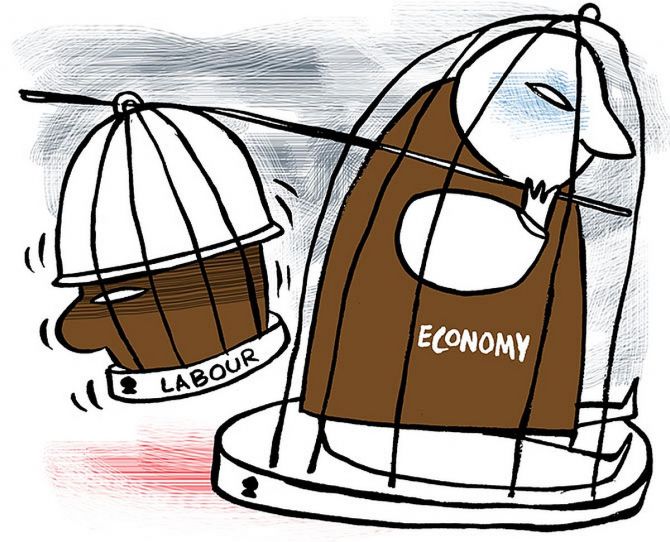The move will help industries in pushing authorities for exemption under various labour laws at a micro-level, along with demanding changes to bring greater flexibility in their operations related to retrenchment, safety standards, and collective bargaining.

The labour codes approved by Parliament will change the way labour laws are legislated, with the Centre bestowing more powers to states to make amendments through the executive route.
The move, after securing President Ram Nath Kovind’s nod, will help industries in pushing authorities for exemption under various labour laws at a micro-level, along with demanding changes to bring greater flexibility in their operations related to retrenchment, safety standards, and collective bargaining.
Under the Industrial Relations Code, 2020 - the new law that will govern retrenchment, layoffs, trade unions, and industrial disputes - states can exempt new industrial units from “any or all provisions” of the code “unconditionally” for a specific period of time as it thinks fit through a notification.
States can take such a step in “public interest”, which is not broadly defined.
The Industrial Disputes Act of 1947 did give states similar powers to exempt existing industrial units, but it specifically mentions that such companies should have a mechanism in place to investigate and settle industrial disputes.
States will not have to seek the Centre’s approval to ease retrenchment, layoffs or closure norms, as is required under the existing law.
While allowing firms with up to 300 workers (from 100 workers) to retrench or layoff workers without seeking the government’s nod, the code mentions that states can “increase the threshold to higher numbers by a notification”.
This had been one of the contentious issues faced by the governments since trade unions raised strong objections to any relaxation in retrenchment norms.
As many as 16 states have already relaxed this threshold, Labour and Employment Minister Santosh Kumar Gangwar had told Parliament, but these had to be introduced through changes in the state legislature, after seeking the President’s nod through the central government.
This is because labour falls under the concurrent list of the Constitution wherein both the central and state governments can legislate.
Similarly, the Occupational Safety, Health and Working Conditions Code, 2020, which deals with safety, welfare and workplace-related norms in establishments, empowers states to exempt new factories from any provisions of the new law if it is satisfied “in the public interest that it is necessary to create more economic activities and employment opportunities”.
It has further allowed exempting existing establishments from any provisions of the new code in case of an emergency, provided certain conditions are fulfilled.
Under the present law, states have limited powers towards exempting factories from labour laws.
The Factories Act, 1948, allowed exemptions from its provisions in cases of public emergency only for a period of three months.
To make changes or give exemptions from the law to factories for a longer duration of time, states had to approach the central government.
Also, there was no provision in the law to give unbridled exemption to factories for boosting economic activities or creating jobs - which is one of the objectives of most businesses.
The working conditions and safety norms, which are part of the Factories Act, will be stated through rules by the government, thereby allowing more flexibility.
“Under the Constitution, the legislature has the power to make laws and the government is responsible for implementing them.
"Often, the legislature enacts a law covering general principles and policies, and delegates detailed rule-making to the government to allow for expediency and flexibility.
"However, certain functions and powers should not be delegated to the government.
"These include framing the legislative policy to determine the principles of the law,” stated a note on labour law reforms prepared by PRS Legislative Research.
Labour economist and XLRI Professor K R Shyam Sundar pointed out that the industry has been demanding the Centre to amend the Constitution to bring labour under the state list.
TeamLease Services co-founder and executive vice-president Rituparna Chakraborty welcomed the government’s move to bring in an element of flexibility to alter the labour laws through the executive route or by passing on more powers to states.












 © 2025
© 2025